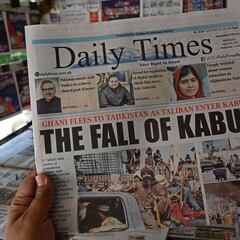The Taliban in Afghanistan: why do they want power and what are their rules?
The capture of Kabul on August 15 marks nearly 20 years since the group were ousted and there are concerns that they will impose their harsh rule again.


The desperate scenes unfolding at Kabul international airport are the results of the Afghan population's fears for Taliban rule. In their short rule, the Taliban were notorious for their punishment of criminals and the roles women were permitted to have in their society. The Taliban see their control of Afghanistan rightful after they were deposed by NATO in 2001 and are justified by their perception of Islamic, sharia, law. The international community will be remaining watchful of the Taliban as they seek to consolidate their new state.
The Taliban attitude to law
In their original rule, the Taliban enforced a strict version of sharia law. Under Sharia law, there are two types of offenses: tazir and hadd. Hadd crimes are considered the worst, including theft and adultery. During its former rule, the Taliban punished hadd crimes by amputation, stoning and execution. An uncorroborated video on Twitter supposedly showed two child abusers who had been hung off lamp posts in Helmand province weeks ago, potentially showing the return of these punishments.
Sharia law also means the necessity to wear traditional and conservative clothing. There have been pictures of the streets in Kabul where shop owners have been painting over previous images of women in dresses and men wearing jeans in case they draw the ire of the new government.
💔Love this street - usually windows full of sparkling dresses .. #Kabul #Afghanistan https://t.co/FnLi7csncF
— lyse doucet (@bbclysedoucet) August 15, 2021
And the people who helped the NATO mission?
Alongside evacuating western personnel, the Kabul airport evacuation is aimed at rescuing the Afghans which assisted the NATO military mission. This includes translators, government officials and local helpers. The Taliban have issued statements aimed at reassuring Afghans. They say there will be no revenge attacks on those who worked for the government or its security services, and that “life, property and honor” will be respected. They are urging Afghans to remain in the country and have pledged to create a “secure environment” for businesses, embassies, and foreign and local charities.
But actions in conquered territories show evidence to the contrary. There are reports that during the conquest of Kandahar province, the Taliban executed over 1,000 suspected members of the Afghan armed forces or government employees. Once the NATO forces are out of Kabul, there are no guarantees that a repeat will be avoided. Numerous Afghans have been on news and radio saying how they are hiding and praying to be evacuated lest the Taliban find them and execute them. One of the primary factors for the quick advance was the fear in cities of Taliban reprisals.
Related news:
- Why has the United States left Afghanistan?
- What is Afghanistan's situation in the Middle East?
- Kabul residents overrun airport in scramble to flee Taliban
- Who funds the Taliban in Afghanistan?
- Who are the Taliban and what are their motives?
The Taliban attitude to women
Related stories
During the last period of Taliban rule, women were barred from working or studying and were unable to leave the house unless accompanied by a male guardian. Girls could only be taught at school until the age of 10. Women are obliged to wear the fully-covering burqa too. Breaking these rules put women at risk of public humiliation and beatings. There is evidence that these practices have returned. In Kandahar province, women in the Azizi Bank were marched out of the offices by fighters and told not to return to work. Many fear that this shows the liberties gained over the last twenty years for women will be quashed.
We watch in complete shock as Taliban takes control of Afghanistan. I am deeply worried about women, minorities and human rights advocates. Global, regional and local powers must call for an immediate ceasefire, provide urgent humanitarian aid and protect refugees and civilians.
— Malala (@Malala) August 15, 2021
There has been an inkling of changing attitudes to women in the Taliban command structure. The Taliban's new professed 'Islamic system' is supposed to allow women to work and be educated. The official line is the group is open to having women's education, but many of the local commanders impose their own version of the rules. This is especially true in the conservative countryside; it remains to be seen how women will be treated in the large urban centers that have been liberalized over the last twenty years.

